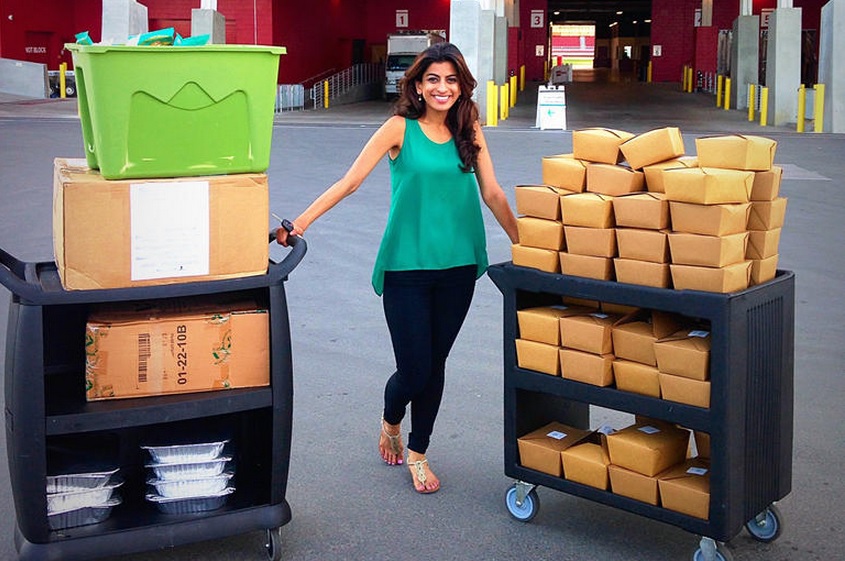By Yara Boraie
“Finish your food! People are starving in Africa, and you’re not even finishing your food? Who do you think you are?”
Like many South Asian families, Komal Ahmad recalls her Pakistani parents’ stern lesson not to waste food at her daily family dinners.
Today, the 25-year-old is CEO of a successful non-profit, Feeding Forward, whose innovative phone app that has since helped feed almost 600,000 people in an effort to curb America’s ever-growing food-waste problem.
Ahmad says the inspiration came from one lunch that changed her life.
While attending the University of California at Berkley in 2011, a homeless man asked Ahmad for money to buy food. Instead of giving him money, she invited him for lunch where he told her that he was a soldier who recently returned from Iraq but had a turn of bad luck.
“He’d already gone on two deployments and now he’s come back, he’s 26 and on the side of the road begging for food,” said Ahmad. “It just blew my mind.” She soon recognized that many homeless people were former war veterans, but were rewarded with the brutal life of going hungry on the streets – a problem she was determined to solve.
Living by the famous quote by Mahatma Gandhi – “Be the change you wish to see in the world” – Ahmad has since become a fierce advocate for public service.
In just a few months, she set up a food recovery service called BareAbundance at Berkley to help provide meals to hungry people in the area – an initiative that soon expanded to about 140 colleges and universities across the country in three years.
To Ahmad, excess food wastage is “literally the world’s dumbest problem.”
“Imagine a football stadium filled to its brim. That’s how much food goes wasted every single day in America,” Ahmad said. “There is more than enough food to feed the entire population over three times, but the problem is that we have an inequitable distribution of food. And it’s staggering that even in a wealthy and powerful nation like the U.S., we still have so many people begging for it.”
According to the US Environmental Protection Agency, an astounding amount of excess food dumped away is sent to landfills everyday instead of feeding a hungry, homeless person in need.
Through the Feeding Forward mobile app, any business with excess food can easily connect with one of the Feeding Forward’s drivers through its platform instead of tossing it away. An algorithm matches these donor contributions with the nearest shelter, food bank, churches and other meal providers in need of food for hungry residents. Volunteer drivers then pick up the food and deliver it to nearest shelter or food bank in need and take photos of the food so the donor gets a chance to see how their efforts can have a real impact and encourage to continue to do so in the future.
Feeding Forward wasn’t Ahmad’s first initiative on health crisis as she took on a mobile HIV clinic throughout the summer of her second year at the university in Tanzania. However, due to her incomplete education, Ahmad felt that she lacked the skills and experience needed to offer effective, long-lasting treatment for the patients in need. She decided to complete her degrees in international health and development and global poverty and practice, and start local before moving across the globe with her initiative.
Today, most successful charity establishments rely solely on online opportunities to raise funds in the form of live tweeting, sharing Facebook posts, collaborating commercially through a Youtube video, etc. to effectively spread a good cause beyond borders and barriers.
“People use their mobile devices in a different way than their desktop computers, often filling spare time browsing and viewing, not really expecting to transact. This is why mobile giving transactions need to be incredibly easy, transparent, and safe,” Elizabeth Kessick, Head of Insight at JustGiving affirms. “If you see a story which compels you to donate, you want to be able to get your phone out right that moment and show your support.”
Currently operating in the Bay Area from Berkeley to San Jose, Feeding Forward has recovered more than 684,000 pounds of food since the service’s launch. Thousands of people from “as far as Nairobi, Bangalore and Hong Kong” have also written to the CEO asking to expand the service to their cities as well.
The Feeding Forward app is currently undergoing a revamp and is set to relaunch in August 2015. The non-profit’s website version however, is still up and running.
“Food is a fundamental human right. It’s also a stepping stone to living a healthy and productive life,” said Ahmad. “We have the power, technology, and knowledge to tackle hunger. I couldn’t think of a better way than to use my phone and instantly connect those with excess food to those in need of feeding.”




















Comments